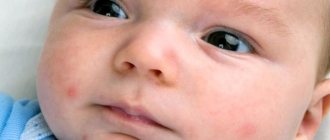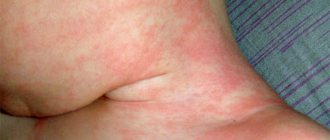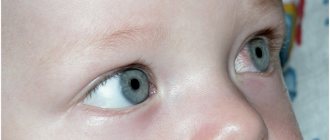When breastfeeding, labial, genital and herpes zoster forms most often occur. The virus is highly contagious, so women should follow rules to help prevent infection of their newborn.
When breastfeeding, labial, genital and herpes zoster forms most often occur.
What is herpes
This pathology of a viral nature manifests itself in the form of bubbles, which can have different locations (genitals, lips, lower back, etc.). The first mention of this disease is in the works of ancient Greek doctors.
Herpesvirus is transmitted by airborne droplets or contact. It is impossible to completely get rid of it. Once in the human body, it remains for life. At the same time, the virus cannot exist on its own; it integrates into nerve cells.
The body reacts worst to primary infection. Then it begins to synthesize antibodies that resist the virus. However, when the immune system is weakened (during lactation, pregnancy, hypothermia, etc.), the body’s protection against herpes is reduced, resulting in a period of exacerbation.
According to statistics, the herpes virus is in the body of 90% of the world's inhabitants.
Prevention
Herpes is difficult to avoid. The infection, sooner or later, penetrates into every body before the age of 40. Immunity helps to avoid exacerbation of the disease. In a healthy state, the body’s protective functions easily suppress specific harmful agents, preventing the spread of infection. It is important to adhere to preventive measures.
- Immunity support - vitamins, walks in the fresh air, giving up bad habits.
- Sleep 8 hours a day.
- Healthy menu - proteins, vitamins and minerals, fatty amino acids (meat, fish, cereals, vegetables, fruits).
- Avoiding stress and nervous tension.
- Sports activities - running, swimming, moderate strength training.
- During the height of the infection, avoid crowded places and wear a mask.
- Use only your own hygiene items.
- Wash your hands with soap 5 times a day.
- Disinfect the child’s objects - toys, dishes, crib railings.
Normally, in an infected person, rashes appear once every 2-5 years or do not bother them at all. Favorable periods for exacerbation are seasons of respiratory diseases, after illness.
If herpes worsens more than once every 12 months, an examination is required. The sign indicates persistent immunity disorders caused by chronic diseases.
For the safety of the baby, breastfeeding mothers are usually treated with folk remedies. But with herpes, such methods are ineffective; the infection requires qualified assistance from a therapist. A course of safe medications suppresses exacerbations in 3-5 days without the need to stop breastfeeding.
Dessert for today - a video about how to get rid of herpes in one day.
[youtube.player]
Causes of herpes during lactation
Factors provoking exacerbation of the disease:
- Physical or psycho-emotional stress . If a mother does not get enough sleep and is constantly stressed, her immune system works weaker. This makes a woman extremely vulnerable to an exacerbation of the virus.
- Unbalanced diet. If a child has an increased tendency to allergies, this requires the mother to follow a specialized diet. The food a woman consumes before breastfeeding her baby does not provide her with enough energy and nutrients. As a result, immune functions are sharply reduced.
- Incorrect use of medications . Sometimes young mothers, while breastfeeding, independently treat herpes on the lips, using immunostimulants. However, practice shows that such manipulations make the situation even worse.
To avoid problems, you need to talk to your doctor. The specialist will advise how to protect the child and how to treat herpes during breastfeeding.
Causes of the disease
Herpes virus
If a herpes agent enters a room, its activity remains active for 24 hours. Moreover, the lower the air temperature, the longer the viral particle lives.
At 45-50 °C, herpes lives for 24 hours, at 30 °C - 48 hours, at sub-zero temperatures - up to 5 days. If you breathe in the air in an infected room, a person will become infected instantly; the virus will penetrate the blood within 2-4 hours.
Methods of infection
- contact – kisses, hugs with a sick person;
- household - through common items, hygiene products;
- airborne;
- sexual.
The virus instantly attaches to the mucous membrane, penetrates cells, destroying some and moving to others. With normal immunity, the activity of herpes is suppressed by protective forces, but in the postpartum period the body cannot cope with the infection in 50% of cases. The result is the appearance of rashes on the lips, chest, and genitals.
If a woman detects herpes on her lips 1-2 times during a year and a half of breastfeeding, this is normal. More frequent exacerbations of herpes infection indicate the existence of additional factors that suppress immune forces.
Factors provocateurs
Factors that contribute to the activation of the herpes virus include:
- hypovitaminosis;
- hypothermia;
- overheating in the sun;
- weakening of the immune system;
- stress;
- intoxication.
Manifestations of herpes more often than 2 times a year for 2-3 years indicate a persistent violation of the immune response. Characteristic of malignant neoplasms and HIV infection, progressing to the AIDS stage.
But in 70% of cases, the activity of the virus is suppressed within 7-10 days by standard antiviral therapy and does not entail dangerous complications. A nursing mother is recommended to have a nutritious diet and take multivitamin complexes.
Effect on the body of mother and child
If the herpes virus is activated during breastfeeding, lactation should not be abandoned.
In addition, there is no need to make any changes to the feeding regimen, because... the pathogen cannot infect a child through milk. The only exceptions are situations when vesicles and rashes are located in the nipple area. Some time after an exacerbation, the body begins to synthesize antibodies that eliminate pathogenic agents. However, with a weakened immune system, the body is unable to cope with them on its own. As a result, the pathogen manifests itself in the form of skin rashes and sores on various parts of the body.
Symptoms and types of herpes
The disease during breastfeeding can manifest itself differently depending on the type of pathogen. In addition, the choice of treatment tactics is selected taking into account the nature and location of the pathology.
There are eight types of human herpesvirus. In this article, we will consider the three most common:
- Herpes simplex virus type 1;
- Herpes simplex virus type 2;
- Human herpesvirus type 3.
The first type leads to the appearance of a rash and small wounds on the nose, lips and other parts of the face.
Type 2 disease affects the genital area.
The third type of herpesvirus causes shingles and varicella (chickenpox).
Herpes on the lips (cold)
This form of herpes is the most common. Its development is provoked by herpesvirus type 1. The pathogen is transmitted through household contact (using shared personal hygiene products and utensils) and kissing.
A sign of exacerbation of the pathology is itching and swelling in the lip area. In some cases, blisters with liquid contents inside appear on the sinuses and skin near the lips.
Therapy is carried out using local means. The sooner the problem area is treated, the lower the risk of complications.
Expert opinion
Guseinova Natalia Alexandrovna
Pharmacist-pharmacist. Graduated from the Faculty of Pharmacy of KSMU. Work experience in a pharmacy for 13 years.
Primary infection is accompanied by general malaise, fever and a feeling of aching joints.
Repeated exacerbation of the disease does not cause such reactions.
For prevention, I recommend using special hygienic lipsticks.
Genital or vaginal herpes
This type of pathology is associated with the development of type 2 virus. The disease can occur again and again due to decreased immunity of the female body.
The disease is preceded by a feeling of malaise, fever and chills. A few days later, a rash in the form of blisters with cloudy and liquid contents appears on the affected areas.
These bubbles rapidly spread over the skin of the pubis, perineum, thighs, etc. At the same time, the woman feels severe itching. When the blisters rupture, pain appears when emptying the bladder, because... urine penetrates into the resulting wounds.
To solve the problem, you need to contact a gynecologist or dermatovenerologist. The specialist will select safe drugs and correctly determine their dosage regimen.
The disease is much easier to tolerate with timely treatment, so a visit to the hospital should not be postponed.
Shingles
This pathology is caused by herpesivirus type 3. The pathogen penetrates nerve cells, so during lactation it can cause a rash and discomfort.
Primary infection is accompanied by weakness and fever. In this case, typical rashes appear in the area where the nerve endings are located. They can affect a large area.
This form of the disease must be treated not only with local medications, but also with antiviral drugs for oral administration.
What to do if mom has herpes
If a woman has been diagnosed with herpes, she does not need to stop breastfeeding. However, during this period she must follow a number of rules:
- Lactation should be stopped only if a rash and blisters appear in the nipple area. If the disease affects only one mammary gland, the child needs to be given another. At the same time, milk must be expressed from the affected breast, otherwise you may encounter milk stagnation.
- If there are rashes on the lips, it is forbidden to kiss the child. In addition, contact with other affected areas should be avoided.
- Before feeding, you should wash your hands thoroughly with soap. No other antiseptic agents are required.
If you follow these rules, the child will be completely safe.
How to avoid herpes
Prevention of herpetic infection is carried out in nonspecific ways. You need to spend a lot of time in the fresh air and eat enough protein foods. Sometimes you need to give yourself a rest during the daytime, postponing all household chores for later.
If a young woman has frequent recurrences of herpes, it needs to be treated before pregnancy . Vaccines have been developed that can lead to persistent remission or complete disappearance of symptoms. But vaccination takes time. Therefore, pregnancy needs to be planned. If you use the vaccine before conception, then after childbirth you will not have to think about ways to safely treat herpes infection.
Treatment of herpes during breastfeeding
Drug therapy
During lactation, you can use topical medications to combat the herpes virus. For this purpose, the following means are prescribed:
- Acyclovir. This medicine has antiviral properties. It is used in the treatment of all types of herpetic lesions. The advantage of the drug is that it does not pass into breast milk, so it cannot harm the baby.
- Valaciclovir. This medicine is also often used during lactation. It must be used according to the instructions.
- Penciclovir. The drug is made in the format of an ointment, which needs to be used to treat problem areas. During the treatment period, the child must be protected from contact with the medication.
Dosages and dosage regimens should only be selected by a medical specialist. In severe cases, the doctor may prescribe immunostimulating medications.
Traditional methods of treating herpes during breastfeeding
It is possible to use folk remedies for this pathology, but in this case it is necessary to take into account a number of features:
Firstly, homemade recipes do not have pronounced antiviral activity, so they are not able to eliminate the pathogen. Such compositions can only be used as an aid.
Secondly, some folk remedies can be dangerous for nursing women and children. Therefore, before using any product, you should definitely visit a doctor.
As for the traditional medicine itself, tea tree oil, sea buckthorn extract, aloe juice and some other remedies can be beneficial during breastfeeding.
These substances allow you to quickly get rid of pain and itching. In addition, they effectively eliminate inflammatory processes and accelerate the regeneration of the epidermis after rupture of herpes blisters.










